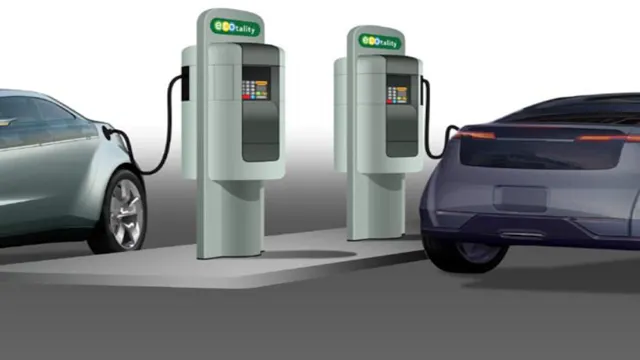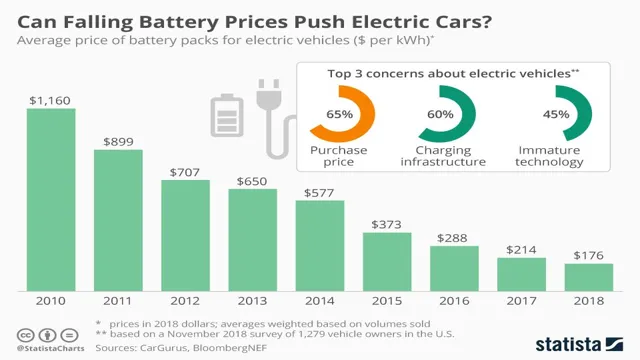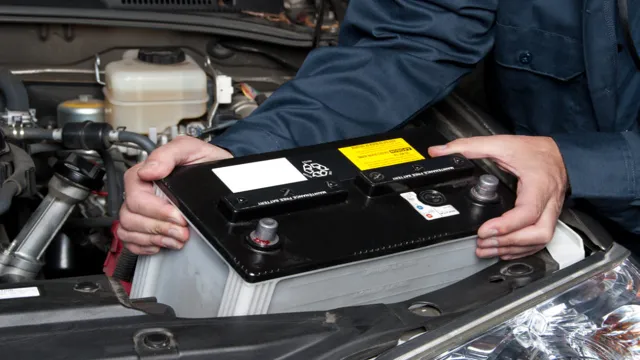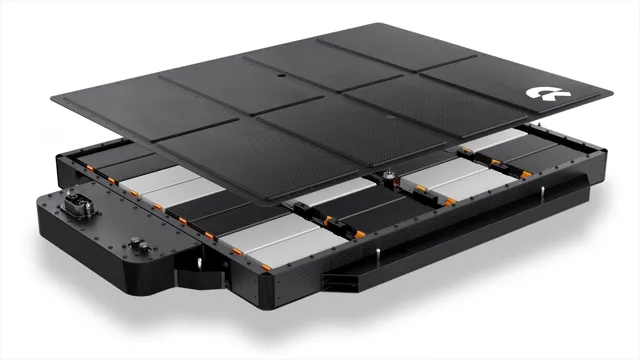Revving up your Ride: All You Need to Know About Electric Car Battery Charging Voltage
If you own an electric car, you may be wondering about the voltage required for charging your battery. Understanding this key aspect of EV ownership is crucial to ensuring you always have a fully charged vehicle when you need it. At its simplest level, the voltage needed to charge an electric car battery will depend on the capacity of the battery itself.
A larger battery will require more voltage to charge fully. However, there are other factors that come into play as well, including the type of charger you’re using and the speed at which you want to charge your battery. When it comes to EV charging, your options for voltage will typically fall into two categories: level 1 and level
Level 1 charging requires a standard 120-volt household outlet and can take around 12-24 hours to fully charge your battery. Level 2 charging usually requires a special EV charging station, offering higher voltages (roughly 240 volts) and faster charging times (around 4-8 hours for a full charge). If you’re hoping to hit the road quickly, it’s worth noting that some EV models also offer “DC fast charging,” which can get you up to an 80% charge in as little as 30 minutes.
However, these charging stations are less common and may require an additional fee. Overall, understanding the voltage needed to charge your EV battery is an essential part of owning an electric car. By familiarizing yourself with the different charging options available and how they relate to your car’s battery capacity, you can make informed choices about how and when to charge your vehicle for the best possible performance and convenience.
What is the Ideal Charging Voltage for Electric Car Batteries?
When it comes to electric car battery charging voltage, it’s essential to find the ideal level for your specific vehicle. Most EVs can charge between 200 and 500 volts, with Tesla models typically using 400-volt batteries. However, the ideal charging voltage is ultimately determined by the battery’s chemistry and design.
Lithium-ion batteries, the most common type used in EVs, have a recommended charging voltage range of 6 to 2 volts per cell.
Fast charging, which charges the battery at a higher voltage and current rate, can significantly decrease the overall lifespan of the battery. It’s crucial to strike a balance between charging speed and battery longevity to ensure optimal performance and longevity. In conclusion, when charging an electric car battery, it’s vital to find the right voltage to ensure the battery’s optimal performance, longevity, and reliability.
Exploring the Optimal Voltage Range for Charging Electric Car Batteries
Electric car batteries have revolutionized the automotive industry as they are efficient and environmentally friendly. However, finding the optimal voltage range for charging these batteries is essential to ensure their longevity and performance. The ideal charging voltage for electric car batteries typically ranges from
6V to 1V per cell, depending on the battery chemistry and charging method. Charging the batteries beyond this range can lead to overcharging, which results in the accumulation of heat and causes damage to the battery.
On the other hand, charging them below this range can result in undercharging, leading to insufficient power output and a reduced lifespan of the batteries. Therefore, it is critical to charge them within the recommended voltage range to ensure optimum performance and longevity. To achieve this, electric car manufacturers install sophisticated battery management systems capable of monitoring the battery’s state of charge, temperature, and voltage, ensuring the batteries charge within the optimal range.
In conclusion, the ideal charging voltage for electric car batteries is critical in ensuring their performance, longevity, and safety, and should be strictly adhered to.
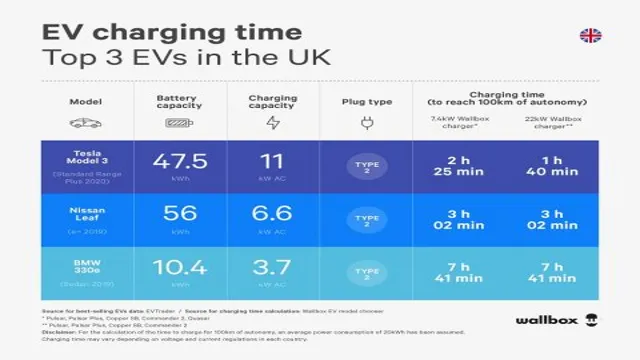
Factors That Affect Electric Car Battery Charging Voltage
Electric car batteries require a specific charging voltage to perform optimally and extend their lifespan. However, several factors can affect the ideal charging voltage for electric car batteries, including temperature, battery age, battery chemistry, and charging speed. As a general rule, the ideal charging voltage for most electric car batteries ranges from 380V to 480V.
Fast charging at higher voltages can result in increased battery temperature, which can reduce the battery’s lifespan. Likewise, slow charging at lower voltages can lead to sulfation, which can also decrease the battery’s performance over time. Therefore, it is crucial to balance the charging voltage with the battery’s chemistry and other factors to ensure efficient and safe charging while maximizing the battery’s lifespan and performance.
Types of Electric Car Chargers and Their Voltage Output
Electric cars are growing in popularity as a more sustainable mode of transportation, but they require a charging infrastructure to keep their batteries powered. Different types of electric car chargers have varying voltage outputs, which affects how quickly a car can charge. Level 1 chargers are simple, low-voltage chargers that can be plugged into any three-prong outlet.
These chargers typically output 120 volts and can take up to 20 hours to fully charge a depleted car battery. Level 2 chargers, on the other hand, require a dedicated circuit and are typically installed in homes or public charging stations. These chargers offer higher voltage, typically 240 volts, and can charge a car in as little as a few hours.
Finally, there are fast chargers or DC chargers that can charge a car in as little as 30 minutes, but require specialized equipment and can only be found at select locations. Understanding the different types of chargers and their voltage outputs is crucial for electric car owners to effectively plan their charging needs.
Level 1 Chargers: The Slowest But Most Accessible Option
When it comes to charging up your electric car, there are several options to choose from based on each driver’s unique needs and preferences. One of the most commonly used options is known as a Level 1 charger. This type of electric car charger is the slowest option available, but it’s also the most accessible, as it can easily plug into a standard household electrical outlet.
Level 1 chargers generally provide around 4-5 miles of range per hour of charging time, making them useful for overnight charging or for top-ups during the workday. While they may not be the quickest option, Level 1 chargers are perfect for those who don’t have access to a Level 2 or Level 3 charger, or for those who simply need a slow and steady charging solution.
Level 2 Chargers: The Sweet Spot for Charging Efficiency and Affordability
When it comes to charging electric cars, there are several types of chargers available on the market. The most common types are Level 1, Level 2, and Level 3 chargers. Level 1 chargers are the slowest and typically come with the car, allowing for a 120-volt charge through a standard household outlet.
Level 2 chargers offer a faster charging speed and require a 240-volt outlet, which is commonly used for an electric dryer or oven. These chargers are known as the sweet spot for charging efficiency and affordability, as they offer a faster charge time than Level 1 chargers, while also being more affordable than Level 3 chargers. Level 3 chargers, also known as DC fast chargers, offer the fastest charge time but are the most expensive and are not commonly found in residential settings.
Ultimately, the decision on which charger to use depends on the specific needs of the driver and the availability of charging stations in their area.
DC Fast Chargers: The Most Powerful Option for Quick Charging
If you’re an electric car owner, you’re likely familiar with the different types of electric car chargers available. The most popular options are Level 1, Level 2, and DC fast chargers. The Level 1 charger is the slowest option, providing around 4-5 miles of range per hour of charging.
A Level 2 charger, on the other hand, can add around 25 miles of range in just one hour. But if you’re looking for the most powerful and quickest option, a DC fast charger is the way to go. These chargers can provide up to 80% charge in just 20-40 minutes, depending on the battery size.
With a DC fast charger, you can add around 150-250 miles of range in under an hour. However, it’s important to note that not all electric vehicles are compatible with DC fast chargers, so make sure to check your car’s manual or manufacturer’s website before using one.
How to Ensure Your Electric Car Battery is Charged with the Right Voltage
One of the key factors in keeping your electric car battery in good shape is charging it with the correct voltage. While most electric car manufacturers recommend charging your battery to a maximum of 80% to extend its lifespan, the actual voltage required for charging may vary depending on the make and model of your vehicle. The ideal voltage range for most electric cars is between 220V-240V for Level 2 chargers, which can fully charge a battery in 4-8 hours.
It’s important to note that charging your electric car battery with a voltage that’s too high can damage the battery, while a voltage that’s too low can result in incomplete charging. Therefore, it’s essential to consult your car’s owner manual or seek professional advice to ensure you’re using the correct charging voltage.
Key Considerations When Choosing an Electric Car Charger
When choosing an electric car charger, it’s important to consider the voltage needed to charge your car’s battery. You want to ensure that the charger you select can provide the correct voltage to avoid damaging your battery or causing it to undercharge. Most electric cars require a voltage range of 240V to 480V, but it’s best to check with your car manufacturer to determine the exact voltage needed.
Additionally, some chargers offer different amperage levels, which can affect the charging time. Higher amperage levels may charge your battery faster, but they can also put extra stress on the battery, which can decrease its overall lifespan. Ultimately, it’s important to find a charger that matches your car’s voltage requirements and to choose an amperage level that balances charging speed with battery health.
By taking these considerations into account, you can ensure that your electric car battery is charged safely and efficiently.
Tips for Monitoring and Maintaining Optimal Charging Voltage for Electric Car Batteries
As an electric car owner, it’s essential to monitor and maintain the optimal charging voltage of your car battery. Charging your battery with the right voltage is crucial in maximizing its lifespan and ensuring that the car runs efficiently. There are several ways to achieve this.
Firstly, make sure you use a reliable charger that is compatible with your vehicle. Most electric cars come with a recommended charging voltage range. Be sure to adhere to this recommendation to avoid damaging your battery.
Additionally, monitoring the charging process is crucial. Ensuring that the battery is not overcharged or undercharged is vital in maintaining the optimal voltage range. Consider investing in a smart charger that automatically adjusts to the right voltage range and alerts you when the battery is fully charged.
Monitoring your battery’s voltage is a practical maintenance strategy that will go a long way in ensuring that your electric car is always running efficiently and that your battery is not damaged due to incorrect voltage use.
Conclusion: Optimal Charging Voltage is Key to Efficient and Effective Electric Car Performance
In conclusion, the voltage at which electric car batteries are charged can make or break their performance on the road. Just like Goldilocks’ quest for the perfect porridge, the charging voltage must be just right – too high and it can damage the battery, too low and it won’t charge properly. So, next time you’re plugging in your electric vehicle, remember that getting the right charging voltage is the key to electric driving bliss!”
FAQs
What is the average voltage required for charging an electric car battery?
The average voltage required for charging an electric car battery is 240 volts.
Can I charge my electric car battery using a regular outlet at home?
It is recommended to use a Level 2 charging station (240 volts) for faster and efficient charging. However, you can still charge your electric car battery using a regular outlet, but it will take longer.
What happens if I overcharge my electric car battery?
Overcharging can damage the battery and shorten its lifespan. It may also cause overheating and safety issues.
Can I charge my electric car battery with solar panels?
Yes, you can charge your electric car battery with solar panels, but you need a proper solar charging system that includes a compatible inverter and a battery storage system.

